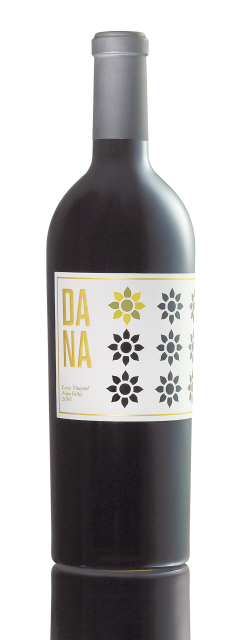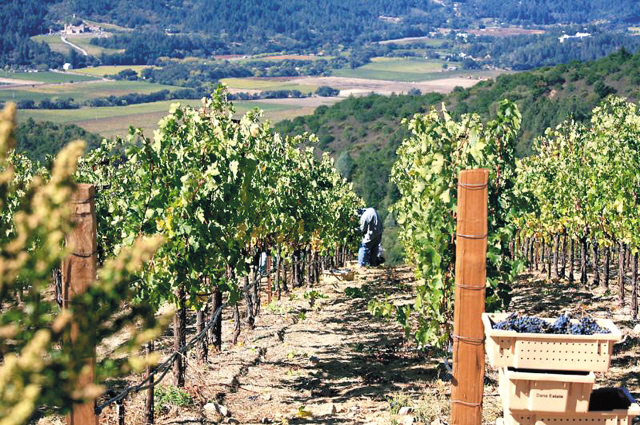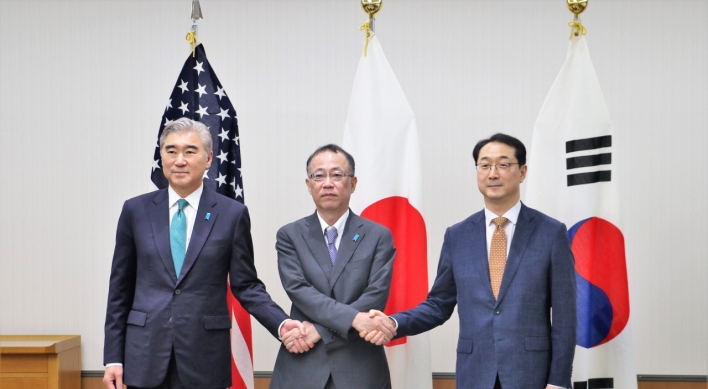Lee helps bring Korea's wine culture forward
DongA One Group chief Lee Hi-sang’s quest to make the world’s best wine
By Lee Woo-youngPublished : Jan. 18, 2013 - 19:50
Lee Hi-sang, chairman of DongA One Group, savors every last drop when he drinks wine. He calls each drop “blood and sweat.”
As a wine lover, he not only imports some of the best wines in the world to Korea, but also works from scratch to make top-quality wine that is internationally recognized.
Lee introduced some of the world’s most famous wines to Korea in 1997 when Koreans were more into soju or beer. In 2005, he entered the world of winemaking by purchasing Dana Estates in Napa Valley, California.
As a wine lover, he not only imports some of the best wines in the world to Korea, but also works from scratch to make top-quality wine that is internationally recognized.
Lee introduced some of the world’s most famous wines to Korea in 1997 when Koreans were more into soju or beer. In 2005, he entered the world of winemaking by purchasing Dana Estates in Napa Valley, California.

His endeavor began to bear fruit in 2009 when his 2007 Lotus Cabernet was given a perfect score of 100 points from esteemed wine critic Robert Parker. His winery rose to an instant stardom in the wine world. Three years later, the 2010 vintage received the same score.
In the meantime, Korea also saw a changing trend in its drinking culture. Sales of wine at supermarkets in Korea outstripped those of soju for the first time in December last year.
“Wine culture in Korea has changed remarkably since I started my wine business. I think it has become a part of people’s lifestyle,” Lee said in an interview with The Korea Herald on Tuesday at his steak restaurant The Barn in southern Seoul.

After taking over his father’s flour mill business, Lee expanded to top high-value-added products to gain advantage in the competitive market.
His company covers a wide array of businesses from flour mills, livestock feed, pet food and grain production to wine and dining. Recently, the company became the official importer of Ferrari and Maserati.
“People ask me why I import wines and Ferrari, but this is all part of my vision to pursue the best in everything,” said Lee.
He said proudly that having his wine receive top scores was also the result of following the goal to achieve top quality. “We proved that by making the best-quality wine,” he said.
First wine with kimchi stew
Lee didn’t drink alcohol until he had his first wine at 33.
“I went to a ski resort in Korea and had kimchi stew with a French wine. And it tasted really good,” said Lee.
He started to fall in love with wine, but found it hard to get a good wine in Korea back in 1978. So he decided to bring them to Korea and started a wine-importing business.
“I was quite worried in the beginning stage of my business because Korea was in economic crisis. But the wine business wasn’t so bad ― unlike my main flour mill business, which was hit hard by the economic situation,” he recalled.
With the aim of creating a sophisticated wine culture in mind, Lee started introducing various wines to people.
“I started by giving people wines for presents on special occasions like promotions and weddings. They liked it more than money,” said Lee.
But it wasn’t an easy task to secure a large enough supply from the exclusive society of Napa Valley.
“It was a series of challenges. It was hard to meet an owner of a winery and if we met, I had to persuade them on how I planned to promote them in Korea,” said Lee.
Then he began door-to-door sales at major hotels and restaurants in Korea.
According to his staff, he likes to serve wine for his employees and the habit might have come from the time he served them to his potential buyers.
“I felt really good when people started to recognize the wines I brought after numerous attempts to bring them to Korea. And at some point, I dreamed of making a wine of my own,” said Lee.
Now he boasts a wide collection of wines not only from Napa Valley, but also from all over the world. His wine business grew from sales of 2.7 billion won ($2.5 million) with a collection of 30 brands in 2000 to sales totaling 32 billion won with a collection of more than 150 labels.

Behind the success is Lee’s persistent effort to break in to the Napa Valley circles and make connections to bring more good wine to Korea.
He used a Korean way of socializing in the U.S. He attended the funeral of Joe Heitz, the owner of the Heitz Cellar, and participated in volunteer work in Tibet with vintner Dick Grace and his wife to get their wine from the famous Grace Family Vineyards.
“I couldn’t even dream about starting Dana Estates if I hadn’t had the connections I made for a decade in Napa Valley. When I was looking for a vineyard, I received tremendous help from them,” said Lee.
He bought three vineyards from 2005-2006 after much research and with valuable information from his friends.
With several trials and errors, he learned to focus on improving wine quality. As a result, his $275 wine was ranked first in the 2008 Napa Cabernet Sauvignon tasting event ― higher than Screaming Eagle and Harlan Estate, which are priced at around $2,000.
Wine as lifestyle
Lee established a wine cultural center called Podo Plaza in Sinsa-dong, Seoul, that features a wine bar, shop, tasting area, a wine academy and a culinary institution.
The wine bar “vin.ga” is the first wine establishment to receive recognition from a prominent American wine magazine. It was given the Award of Excellence from Wine Spectator’s Restaurant Wine List Awards in 2011 and 2012.
He stressed there are many Michelin-starred restaurants in major places in Asia such as Singapore, Hong Kong, Malaysia and Indonesia, but not in Korea.
“I think we lack some kind of master spirit. We see many restaurant and bar owners close their stores and open new ones. It breaks their tradition. This is why the government should help and encourage owners to continue their tradition,” Lee noted.
His company is considered a master in the flour mill industry with 60 years of history. It also accounts for 40 percent of the flour supply in Korea and exports to foreign countries.
Lee intends to keep his success intact, and prepares for sudden changes in the global industry.
He forayed into the grain production industry to ensure a steady supply for his food business.
“I felt the urgency in food security when Australia said they wouldn’t sell any of their flour needed to produce noodles in Korea when they were in their worst drought,” said Lee.
On the other hand, Lee hopes he can contribute to enhancing the national image of Korea through wine.
“People in Napa Valley say they feel it would be unsafe to come into Korea with all the North Korea-related issues,” said Lee. “I think the success of Psy was backed by a positive image of Korea built upon achievements of Samsung and other brands in the global market. I believe having our wine ranked top also contributed to upgrading our national image as well.“
By Lee Woo-young (wylee@heraldcorp.com)










![[New faces of Assembly] Architect behind ‘audacious initiative’ believes in denuclearized North Korea](http://res.heraldm.com/phpwas/restmb_idxmake.php?idx=644&simg=/content/image/2024/05/01/20240501050627_0.jpg&u=20240501225745)
![[Music in drama] Rekindle a love that slipped through your fingers](http://res.heraldm.com/phpwas/restmb_idxmake.php?idx=644&simg=/content/image/2024/05/01/20240501050484_0.jpg&u=20240501151646)






